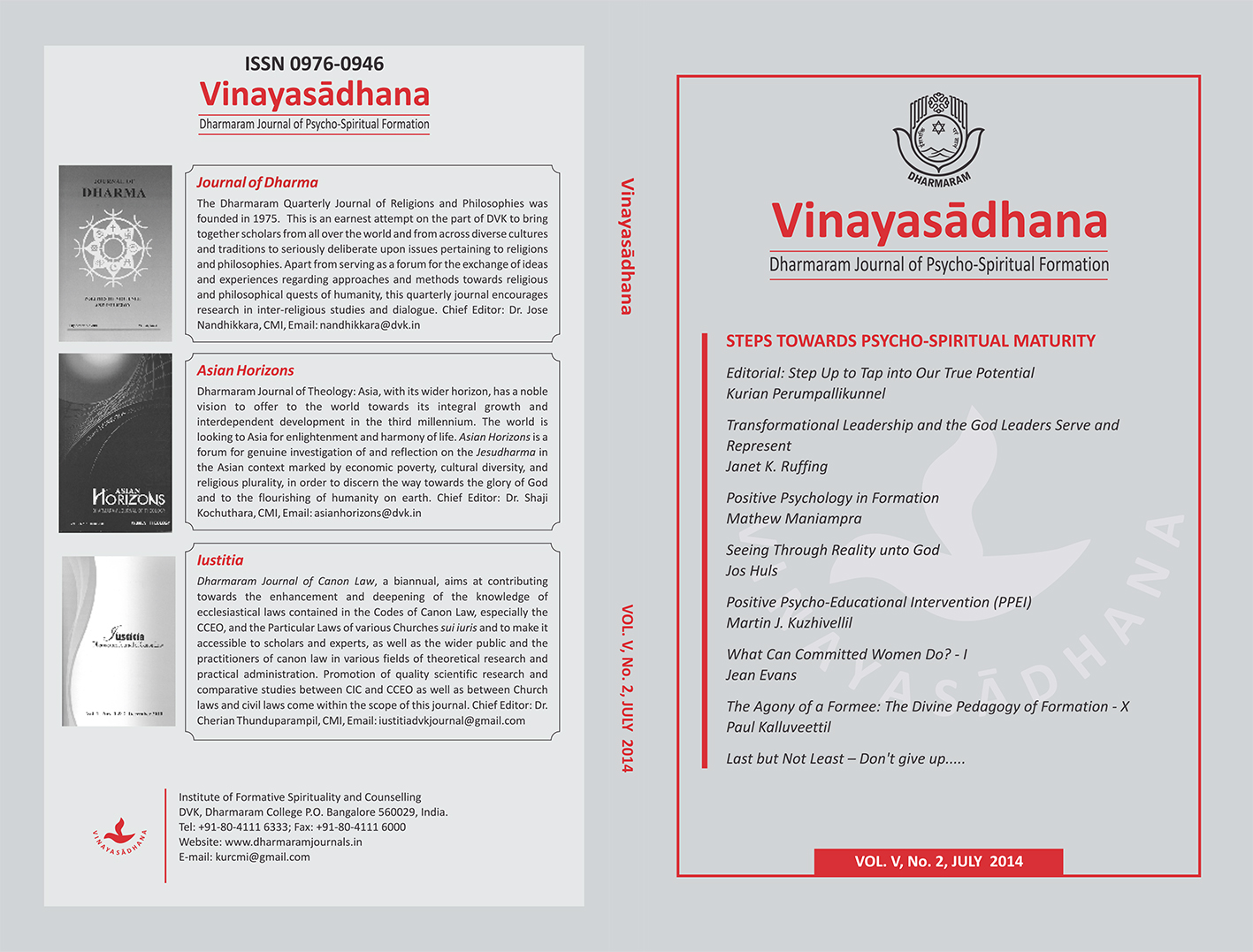Positive Psychology in Formation
Keywords:
Positive Psychology, Formation, OptimismAbstract
The appeal of positive psychology is its optimism about the human condition. Whereas traditional psychology failed to see the joy of life, positive psychology wants to emphasize it without overlooking the fallen human condition. To be broken is no reason to see all things as broken. Formation was looked on as something negative we do to our psychological self and physical self in order to discipline it. As the result of that, formation has not been viewed as a positive experience. Our formation programs shall envision a time when our adolescents are valued for their major strengths. The fundamental value assumption of positive psychology is that the positive is good and wellbeing is a desired outcome. A positive attitude is the royal road to success not only in everyday life but also in self-realization, too. A change from the medical model of formation focusing on negative symptoms to positive potentials will create more adjusted, happy and more fully functioning persons.
References
Ardelt, M. (2000). Antecedents and effects of wisdom in old age: A longitudinal perspective on aging well. Research on Aging, 22, 350-394.
Bryant, F.B., & Veroff, J. (1982). The structure of psychological wellbeing: A socio-historical analysis. Journal of Personality and Social Psychology, 43, 653-673.
Clayton, V. (1982). Wisdom and intelligence: The nature and function of knowledge in later years. International Journal of Aging and Human Development, 15, 315-321.
Csikszentmihalyi, M. (1996). Creativity: Flow and the psychology of discovery and invention. New York: Harper Collins.
Damasio, A. R. (1994). Descartes error: Emotion, reason and the human brain. New York: Putnam.
Emmons, R.A., & McCullough, M.E., (2003). Counting blessings versus burdens. Journal of Personality and Social Psychology, 84, 377-389.
Erikson, E.H. (1959). Identity and life cycle. Madison, CT: International University Press.
Horney, K. (1942). The collected works of Karen Horney (Volume II). New York: W.W. Norton Company.
Jorgensen, I.S., & Nafstad, H.E. (2004). Positive psychology: historical, philosophical, and epistemological perspectives. In P.A. Linley & S. Joseph (eds.), Positive psychology in practice. John Wiley & Sons, Inc., Hoboken, New Jersey.
Jung, C. (1953). Two essays on analytical psychology. New York: Patheon Books.
Keyes, C.L.M. (1998). Social well-being. Social Psychology Quarterly, 61, 121-140.
Keyes, C.L.M., & Lopez, S.J. (2002). Toward a science of mental health: Positive directions in diagnosis and treatment. In C.R. Snyder & S.J. Lopez (eds.), The handbook of positive psychology (pp. 45-59). New York: Oxford University Press.
Langer, E. (2002). Well-being: Mindfulness versus positive evaluation. In C.R. Synder & S.J. Lopez (eds.), The Handbook of Positive Psychology (pp. 214-230). New York: Oxford University Press.
Linley, P.A., & Joseph, S. (2003). Putting it into practice (Special issue on positive psychology). The Psychologist, 16, 143.
McCullough, M.E. (2000). Forgiveness as a human strength: Theory measurements and links to well being. Journal of Social and Clinical Psychology, 19, 43-55.
Murphy, K.R. (2006). A critique of emotional intelligence: What are the problems and how can they be fixed? New York: Lawrence Erlbam Associates.
Myers, D.G. (2004). Human connection and the good life: Balancing individuality and community in public policy. In P.A. Linley & S. Joseph (eds.), Positive psychology in practice. John Wiley & Sons, Inc., Hoboken, New Jersey.
O’Bryne, K.K., Lopez, S.J., & Peterson, S. (2000 August). Building a theory of courage: A precursor to change. In C.R. Snyder and S. J. Lopez, Positive psychology. Sage Publications India Pvt. Ltd., New Delhi.
Putman, D. (1997). Psychological Courage. Philosophy, psychiatry and psychology, 4, 1-11.
Rogers, C.R. (1961). On becoming a person. Boston: Houghton Mifflin.
Ryff, C.D., (1989). Happiness is everything or is it? Explorations on the meaning of psychological well-being. Journal of Personality and Social psychology, 57, 1069-1081.
Ryff, C.D., & Singer, B. (2003). Ironies of the human conditions: Wellbeing and health on the way to morality. In L.G. Aspinwall and U. M. Staudinger (eds.), A psychology of human strengths: Fundamental questions and future directions for a positive psychology (pp 271-287). Washington D.C.: American Psychological Associations.
Salovey, P., Caruso, D., & Mayer, J.D. (2004). Emotional Intelligence in Practice. In P.A. Linley & S. Joseph (eds.), Positive psychology in practice. John Wiley & Sons, Inc., Hoboken, New Jersey.
Scheier, J.F., & Carver, C.S. (1985: 211)
Schwartz, S.H. (1994). Beyond individualism and collectivism: New cultural dimension of values. In U. Kim, H.C. Triandis (eds.), Individualism and collectivism: Theory, method, and applications (pp. 85-122). Newsbury Park, CA: Sage.
Seligman, M.E.P. (2002). Authentic happiness: Using new positive psychology to realize your potential fulfillment for lasting fulfillment. New York: Free Press.
Shapiro, S.L., Schwartz G.E.R., & Santerre, C. (2002). Meditation and positive psychology. In C.R. Snyder & S.J. Lopez. (eds.), The handbook of positive psychology (pp. 632-645). New York: Oxford University Press.
Sheldon, K. M., & King, L. (2001). Why positive psychology is necessary. American Psychologist, 56, 216-217.
Sing, A., & Parminder, K. (2010). Does spiritual intelligence influence the academic achievement of adolescents? New Frontiers in Education 43, 3. 340-345.
Smotkin, D. (2005). Happiness in the face of adversity: Reformulating the dynamic and modular basis of subjective well-being. General Psychology Review, 9, 291-325.
Snyder, C.R., & Fromkin, H.L. (1980). Uniqueness: The human pursuit of difference. New York: Plenum.
Snyder, C.R., & Lopez, S.J. (2007). Positive psychology. Sage Publications India Pvt Ltd., New Delhi.
Tangney, J.P., Boone, A.L., & Dearing, R. (2005). Forgiving the self: Conceptual issues and empirical findings. In E. Worthington (ed.), Handbook of forgiveness (pp.143-158). New York: Routeledge.
Triandis, H.C. (1995). Individualism and collectivism. Boulder, CA: Westview Press.
Vetlesen, A. J. (1984). Perception, judgment and empathy: An inquiry into the preconditions of moral performance. University Park: Pennsylvania State University.
Zohar, D., & Marshall, I. (2000). SQ: Spiritual intelligence the ultimate intelligence. London: Bloomsbury Publishing.


